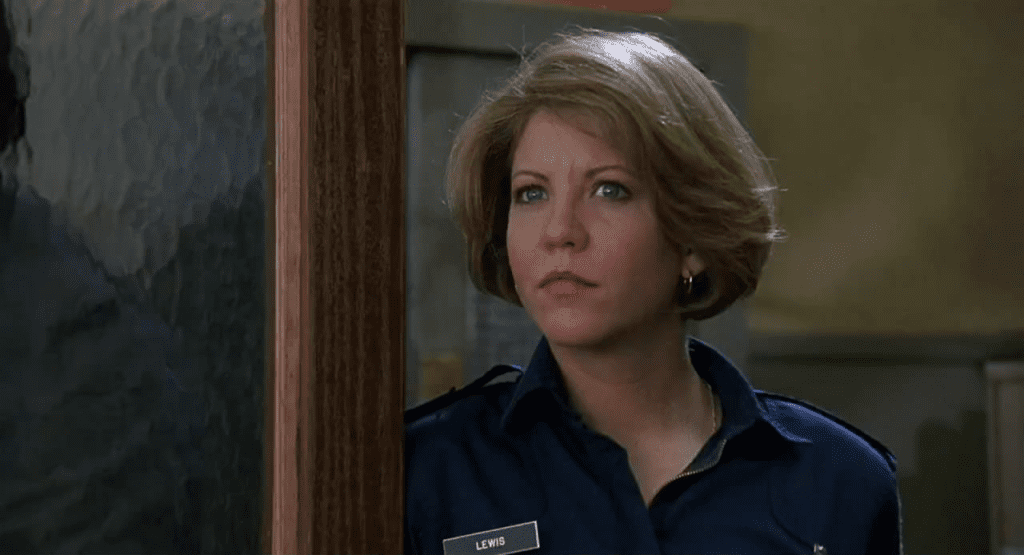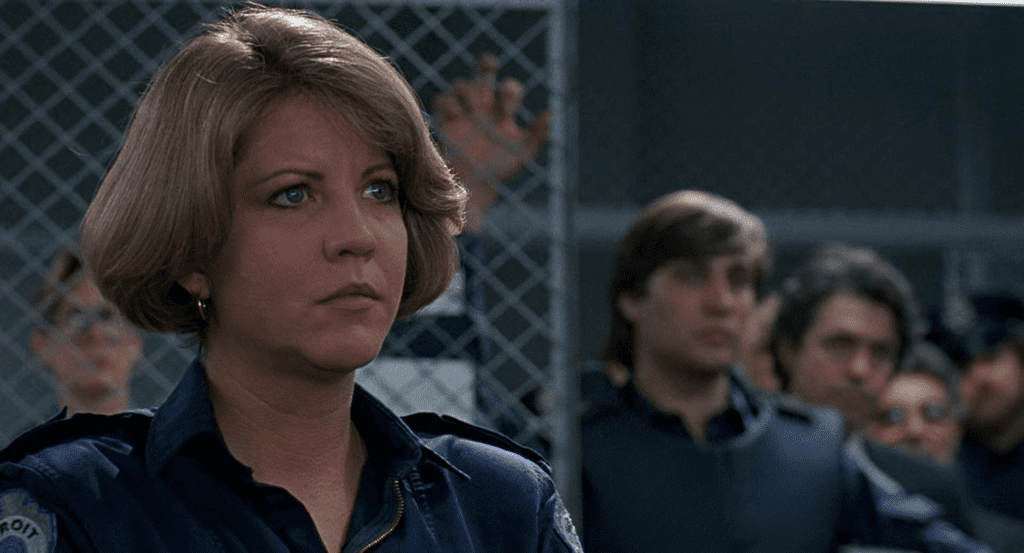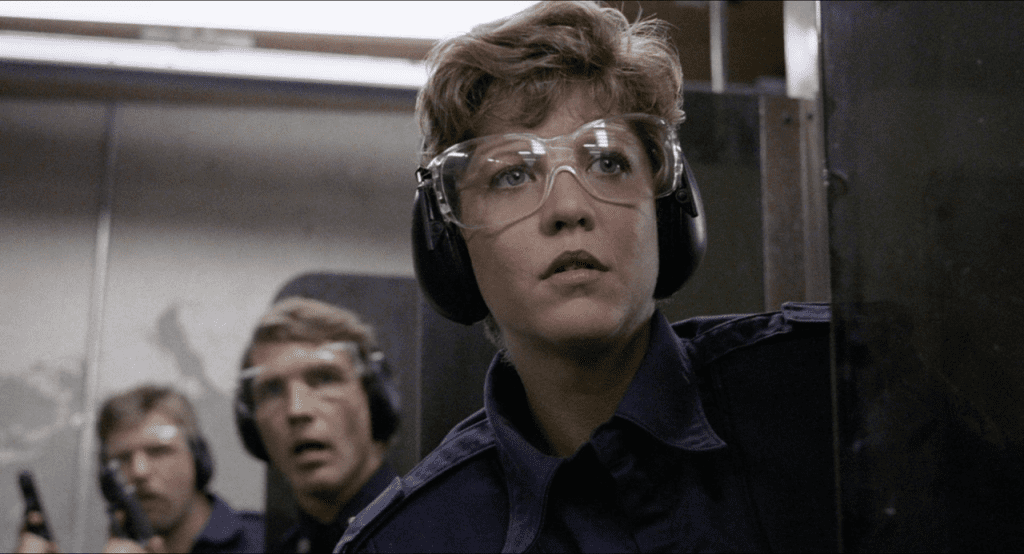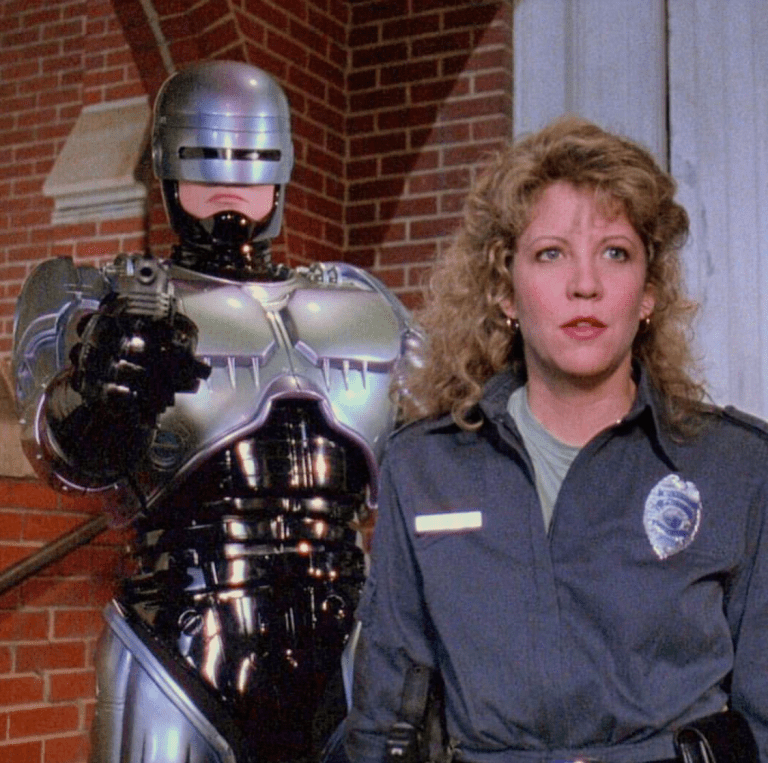Nancy Allen’s portrayal of Officer Anne Lewis in the 1987 sci-fi classic RoboCop stands out as one of the most memorable performances in action cinema. Directed by Paul Verhoeven, RoboCop is a gripping blend of action, social commentary, and emotional depth. Amidst the film’s themes of corporate greed, urban decay, and the clash between humanity and technology, Allen’s performance provided the emotional core that grounded the story. Her portrayal of the tough yet compassionate Anne Lewis remains a defining moment in her illustrious career.
A Groundbreaking Film in the Sci-Fi Genre

RoboCop transports viewers to a dystopian future Detroit, plagued by rampant crime and corruption. The film follows Alex Murphy (Peter Weller), a dedicated police officer who is brutally murdered in the line of duty. Resurrected as RoboCop, a cybernetic enforcer, Murphy embarks on a journey of justice while grappling with the remnants of his humanity.
Amid the film’s chaos and violence, Nancy Allen’s Anne Lewis emerges as a voice of empathy and morality. Her unwavering support and belief in Murphy’s human spirit offer a stark contrast to the film’s darker themes, creating a powerful emotional undercurrent.
Anne Lewis: A Role That Redefined Female Characters in Action Films
In the 1980s, female roles in action movies often fell into clichéd categories—damsels in distress or romantic sidekicks. Anne Lewis, however, broke that mold. From her first appearance, it’s clear that Lewis is a skilled, resourceful cop who can hold her own in a male-dominated precinct.
Nancy Allen’s portrayal emphasized strength and intelligence, but also compassion and humanity. Anne wasn’t just a partner to RoboCop; she was his equal. Her quick thinking and determination played a pivotal role in Murphy’s journey to reclaim his identity and fight against corruption.
Lewis’s bond with Murphy, both before and after his transformation into RoboCop, added depth to the story. She recognized fragments of the man he once was, and her faith in his humanity became the film’s emotional anchor.
The Dynamic Partnership Between Allen and Weller
One of the standout aspects of RoboCop is the chemistry between Nancy Allen and Peter Weller. Their on-screen partnership feels authentic, built on mutual respect and a shared sense of duty.
Allen masterfully balanced Anne’s tough exterior with moments of vulnerability, creating a well-rounded character. Whether standing her ground during a high-stakes confrontation or sharing a quiet, poignant moment with RoboCop, Allen infused every scene with emotional depth.
This dynamic made their relationship one of the most compelling elements of the film. Anne Lewis wasn’t just a sidekick; she was a vital part of RoboCop’s journey, helping him rediscover his humanity amidst the chaos of his new identity.
Allen’s Commitment to Authenticity

Nancy Allen’s dedication to the role of Anne Lewis extended far beyond the script. She underwent extensive training to convincingly portray a police officer, mastering firearms and participating in physically demanding stunts.
Allen also worked closely with law enforcement professionals to bring authenticity to her performance. This commitment to detail paid off, as her portrayal of Anne felt genuine and grounded, further enhancing the film’s impact.
Director Paul Verhoeven praised Allen for her professionalism and depth, crediting her performance as a key element in RoboCop’s success.
The Cultural Impact of RoboCop
RoboCop wasn’t just an action-packed thriller; it was a biting critique of corporate greed, media sensationalism, and the dehumanization of technology. Nancy Allen’s portrayal of Anne Lewis provided a much-needed balance to these darker themes, offering moments of hope and humanity.
The film’s unique combination of satire, violence, and emotional storytelling resonated with audiences and critics alike. It became a box office hit and a cultural phenomenon, spawning sequels, TV adaptations, and a lasting legacy in pop culture.
Anne Lewis in the RoboCop Sequels

Nancy Allen reprised her role as Anne Lewis in RoboCop 2 (1990) and RoboCop 3 (1993). While the sequels received mixed reviews, Allen’s performance remained a highlight.
In these films, Anne continued to serve as RoboCop’s moral compass, helping him navigate the complexities of his dual identity as both man and machine. Allen’s consistency in delivering a grounded, empathetic performance ensured that Anne Lewis remained an integral part of the franchise.
Nancy Allen’s Broader Legacy in Film
While RoboCop is one of her most iconic roles, Nancy Allen’s career is filled with memorable performances. From her breakout role as Chris Hargensen in Brian De Palma’s Carrie (1976) to her work in Dressed to Kill (1980) and Blow Out (1981), Allen has showcased her versatility as an actress.
Her role as Anne Lewis, however, cemented her as a trailblazer for strong female characters in action cinema. Allen demonstrated that strength and empathy could coexist, creating a character who was both relatable and inspiring.
Why Anne Lewis Still Resonates Today

Decades after its release, RoboCop remains a cornerstone of science fiction cinema. Its exploration of identity, morality, and societal decay continues to resonate with audiences. At the heart of this enduring legacy is Nancy Allen’s portrayal of Anne Lewis.
In an era where female characters were often sidelined in action films, Anne Lewis was groundbreaking. Her courage, intelligence, and unwavering loyalty made her a role model for viewers and a benchmark for future female protagonists.
Conclusion: A Legacy That Endures
Nancy Allen’s performance as Officer Anne Lewis in RoboCop is more than just a highlight of her career—it’s a testament to her talent and dedication. Through her portrayal, Allen brought humanity and depth to a film that continues to be celebrated for its innovation and storytelling.
As RoboCop remains a cultural touchstone, Anne Lewis stands out as a shining example of what makes great cinema: characters who inspire, challenge, and connect with audiences. Nancy Allen’s work reminds us that even in a dystopian world dominated by machines, humanity and compassion will always prevail.


